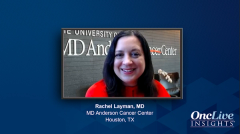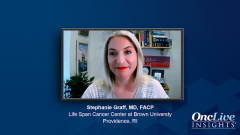
Managing Toxicities and Adverse Events of CDK 4/6 Inhibitors
Stephanie Graff, MD, and Rachel Layman, MD, review common toxicities and adverse effects to watch out for with endocrine therapy and CDK4/6 inhibitors, and how to manage these.
Episodes in this series

Transcript:
Stephanie Graff, MD, FACP: With CDK4/6 inhibitors, many of the adverse events are class, and some of them are drug specific. As a class, CDK4/6 inhibitors have a black box warning for interstitial lung disease. I do tell patients that that’s a risk and I need them to be mindful of any changes in breathing, cough, or new pulmonary symptoms, and that [requires] an emergency call to me. Just make them aware of that potential risk. But it’s exceedingly rare. They all also have a very low risk of venous thromboembolism [VTE]. It’s again important to be aware of that risk, [and] counsel patients. I have not found myself in a position of reflecting on how I consider that in an adjuvant population against their personal VTE history, which now that we’re getting these broader approvals and starting to treat more and more patients, I suspect that that’s going to start coming up more. We’ve all had the experience of it coming up with tamoxifen, in which case we may be having more conversations about, is that a situation where you don’t prescribe? Is that a situation where you do prophylactic anticoagulation?
Again, it probably goes back to shared decision-making, their VTE risk factor, [and] and the situation around their prior history. Maybe you engage with our hematology colleagues or use the hematology half of your brain if you’re both and decide what is in your patient’s best interest. Most patients with a history of VTE were excluded from those trials, so be mindful that the population was probably groomed for all of those studies that shape that low reported risk. The other class effect is cytopenias, neutropenia, and, obviously, lymphopenia. I think we’re all very comfortable dose modifying our CDK4/6 inhibitors based on cytopenia as we monitor for that early and often early dose modification. And then with ribociclib specifically, we see slightly higher rates of hepatic toxicity, although any CDK4/6 inhibitor can do that, and uniquely QT prolongation.
In NATALEE [NCT03701334], the risk of grade 3 QT prolongation was very low, which is probably due to both the lower dose and the better education awareness of the medical oncology community in monitoring for those drug-drug interactions that keep patients doing well and low risk. Those are the keys to being mindful about watching for QT prolongation. [As for] hepatic toxicity, it’s just going to be important for patients on ribociclib that we’re watching their LFTs [live function tests]. There are many situations where our long-term breast cancer survivors don’t need a lot of lab testing. And now that we’re on adjuvant CDK4/6 inhibitors, that will be a more frequent part of our world as breast medical oncologists, and so keeping an eye on those LFTs will be important.
With abemaciclib, it again goes down to diarrhea being a predominant adverse effect. With diarrhea comes electrolyte disturbances and dehydration, contributing to kidney function in severe cases, so lab monitoring is more [for] the secondary effects of severe diarrhea. Hopefully what we’re doing is early aggressive management of diarrhea, not lab monitoring of the adverse effects of diarrhea, nevertheless with still some lab monitoring and toxicity management. Again, as we’ve used all of these agents in the metastatic setting, I think that everybody’s gotten very comfortable with the medications and therapies that help mitigate those adverse effects and keep patients well controlled. Dose modification is our friend for patients who are having significant adverse effects; it’s always key to go ahead and lower [the dose].
Rachel Layman, MD: I agree with all of that. It’s interesting that tamoxifen was studied with the abemaciclib, and I haven’t used it mostly because I would prefer an aromatase inhibitor in this higher-risk population, but the VTE does concern me a little bit. Combining the tamoxifen with the abemaciclib, there was, as would be expected, more thrombotic events in the tamoxifen arm, but the rates were fairly low. But in someone who was on both tamoxifen and abemaciclib, I think you have to be very clear with the patient about that risk and what they should look out for. The other thing that I noticed just in my clinic is [that] I’ve had more blood count issues than I was anticipating with abemaciclib, especially in patients who had started fairly shortly after finishing chemotherapy, so I think it’s nice to keep in mind, as you mentioned earlier, the trial-allowed initiation of abemaciclib into the endocrine therapy. You can wait until it looks like the patient has had a good recovery of their bone marrow, so they’re able to tolerate the drug from a blood count standpoint, which can be an issue even with abemaciclib. I was happy to see in the early NATALEE data that it didn’t look like there were major unexpected problems with blood counts; perhaps using the lower dose helped with that.
Stephanie Graff, MD, FACP: I think it’s important that you let patients recover from chemotherapy. Many of these patients who are eligible for these trials are also going to be receiving radiation because many of them are lymph node-positive, and so you’ve got this longer duration of time that you can let somebody’s hematopoietic system catch up with their recovery, hopefully before you start them on CDK4/6 inhibitors. And you’re right, I just think that early careful monitoring against what else is going on in their life and using that to decide whether it’s dose modification or chemo sluggishness and the art of medicine is called for.
Transcript edited for clarity.






































